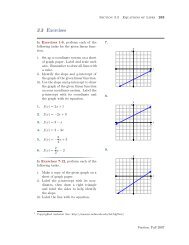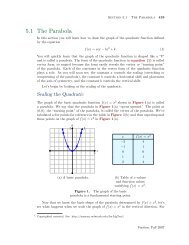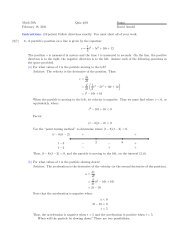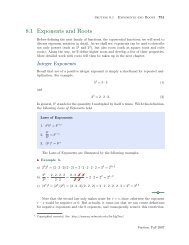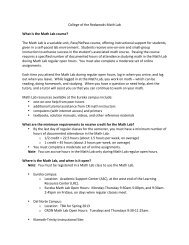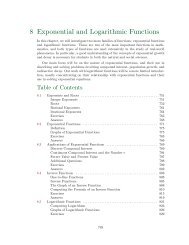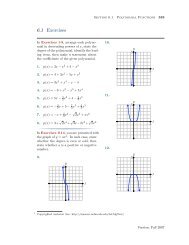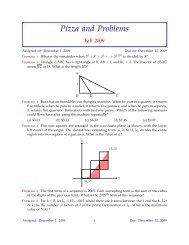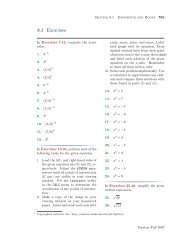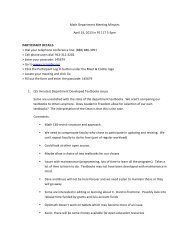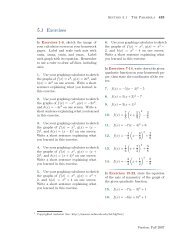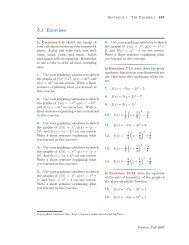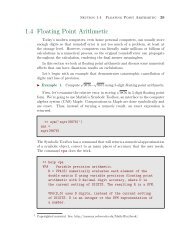Chapter 7 Rational Functions - College of the Redwoods
Chapter 7 Rational Functions - College of the Redwoods
Chapter 7 Rational Functions - College of the Redwoods
You also want an ePaper? Increase the reach of your titles
YUMPU automatically turns print PDFs into web optimized ePapers that Google loves.
Section 7.8 Applications <strong>of</strong> <strong>Rational</strong> <strong>Functions</strong> 743<br />
7.8 Exercises<br />
1. The sum <strong>of</strong> <strong>the</strong> reciprocals <strong>of</strong> two<br />
consecutive odd integers is − 16<br />
63 . Find<br />
<strong>the</strong> two numbers.<br />
2. The sum <strong>of</strong> <strong>the</strong> reciprocals <strong>of</strong> two<br />
consecutive odd integers is 28<br />
195<br />
. Find <strong>the</strong><br />
two numbers.<br />
3. The sum <strong>of</strong> <strong>the</strong> reciprocals <strong>of</strong> two<br />
consecutive integers is − 19<br />
90<br />
. Find <strong>the</strong> two<br />
numbers.<br />
4. The sum <strong>of</strong> a number and its reciprocal<br />
is 41<br />
20<br />
. Find <strong>the</strong> number(s).<br />
5. The sum <strong>of</strong> <strong>the</strong> reciprocals <strong>of</strong> two<br />
consecutive even integers is 5<br />
12<br />
. Find <strong>the</strong><br />
two numbers.<br />
6. The sum <strong>of</strong> <strong>the</strong> reciprocals <strong>of</strong> two<br />
consecutive integers is 19<br />
90<br />
. Find <strong>the</strong> two<br />
numbers.<br />
7. The sum <strong>of</strong> a number and twice its<br />
reciprocal is 9 2<br />
. Find <strong>the</strong> number(s).<br />
8. The sum <strong>of</strong> a number and its reciprocal<br />
is 5 2<br />
. Find <strong>the</strong> number(s).<br />
9. The sum <strong>of</strong> <strong>the</strong> reciprocals <strong>of</strong> two<br />
consecutive even integers is 11<br />
60<br />
. Find <strong>the</strong><br />
two numbers.<br />
10. The sum <strong>of</strong> a number and twice its<br />
reciprocal is 17 6<br />
. Find <strong>the</strong> number(s).<br />
11. The sum <strong>of</strong> <strong>the</strong> reciprocals <strong>of</strong> two<br />
numbers is 15/8, and <strong>the</strong> second number<br />
is 2 larger than <strong>the</strong> first. Find <strong>the</strong> two<br />
numbers.<br />
12. The sum <strong>of</strong> <strong>the</strong> reciprocals <strong>of</strong> two<br />
numbers is 16/15, and <strong>the</strong> second number<br />
is 1 larger than <strong>the</strong> first. Find <strong>the</strong><br />
two numbers.<br />
13. Moira can paddle her kayak at a<br />
speed <strong>of</strong> 2 mph in still water. She paddles<br />
3 miles upstream against <strong>the</strong> current<br />
and <strong>the</strong>n returns to <strong>the</strong> starting location.<br />
The total time <strong>of</strong> <strong>the</strong> trip is 9<br />
hours. What is <strong>the</strong> speed (in mph) <strong>of</strong><br />
<strong>the</strong> current? Round your answer to <strong>the</strong><br />
nearest hundredth.<br />
14. Boris is kayaking in a river with a 6<br />
mph current. Suppose that he can kayak<br />
4 miles upstream in <strong>the</strong> same amount <strong>of</strong><br />
time as it takes him to kayak 9 miles<br />
downstream. Find <strong>the</strong> speed (mph) <strong>of</strong><br />
Boris’s kayak in still water.<br />
15. Jacob can paddle his kayak at a<br />
speed <strong>of</strong> 6 mph in still water. He paddles<br />
5 miles upstream against <strong>the</strong> current<br />
and <strong>the</strong>n returns to <strong>the</strong> starting location.<br />
The total time <strong>of</strong> <strong>the</strong> trip is 5<br />
hours. What is <strong>the</strong> speed (in mph) <strong>of</strong><br />
<strong>the</strong> current? Round your answer to <strong>the</strong><br />
nearest hundredth.<br />
16. Boris can paddle his kayak at a speed<br />
<strong>of</strong> 6 mph in still water. If he can paddle<br />
5 miles upstream in <strong>the</strong> same amount <strong>of</strong><br />
time as it takes his to paddle 9 miles<br />
downstream, what is <strong>the</strong> speed <strong>of</strong> <strong>the</strong><br />
current?<br />
23<br />
Copyrighted material. See: http://msenux.redwoods.edu/IntAlgText/<br />
Version: Fall 2007



